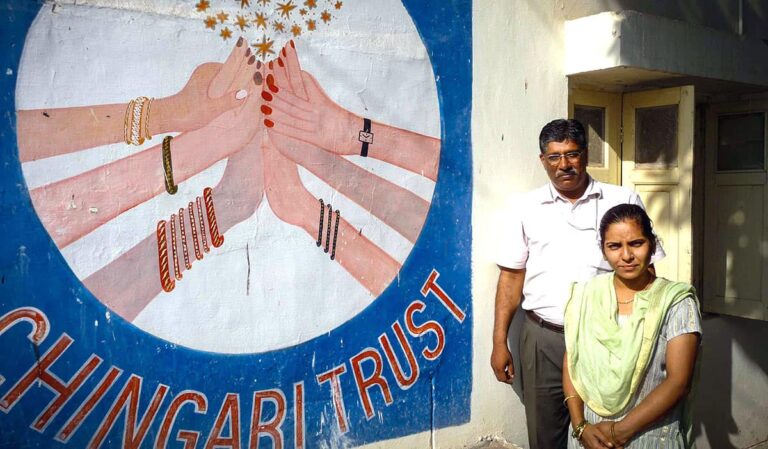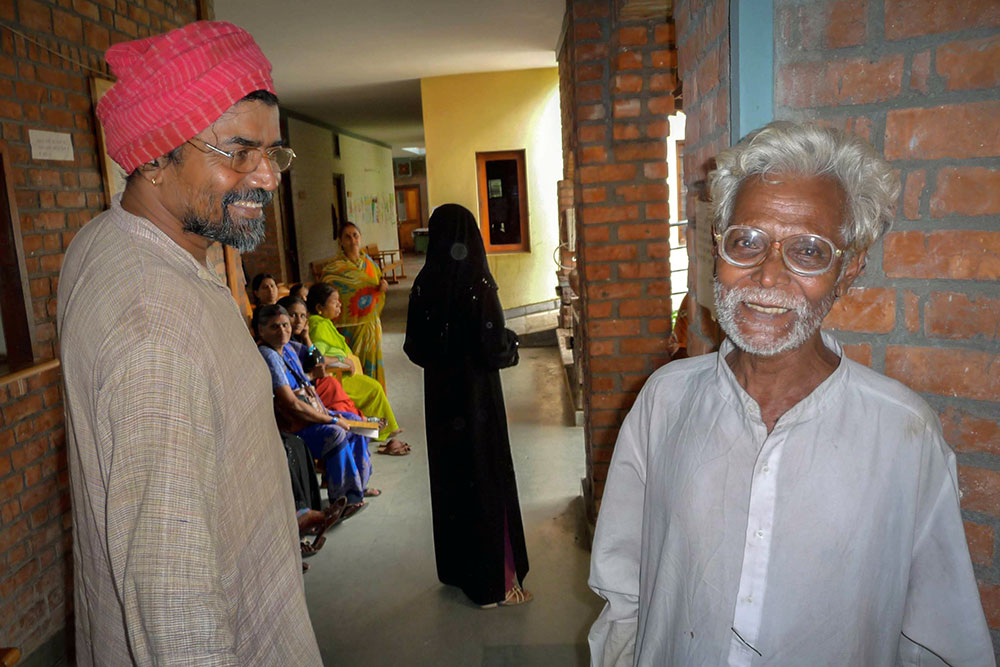Our History
Our first Bhopal Medical Appeal, appeared in The Guardian and The Observer on the 10th anniversary of the disaster, in December 1994, producing a massively generous response.
The first project, with the funds generated from this ad, was to open a clinic in Bhopal and the Sambhavna Trust was formed to run it. Working together, we were able to buy a building and the preliminary work, including purchasing a suitable building and recruiting the doctors and staff, took just over a year. The Sambhavna Trust Clinic opened its doors in 1996.
Later the Sambhavna Trust bought land to build a larger clinic from where it operates to this day. It is a purpose-built facility, designed to the highest ethically sound and sustainable principles, and includes a working garden where herbs and plants used in some of the treatments are grown and processed into high quality medicines.
Working to a principle of ‘first do no harm’ Sambhavna has pioneered new treatments, combining modern medicine with traditional ayurvedic herbal medicine and yoga, and the clinic’s work has won a string of humanitarian awards.
To date the Sambhavna Clinic has provided treatment and support to more than 65,000 people and employs more than 55 staff, just under half of whom are themselves gas survivors. Sambhavna also carries out valuable research and studies; it educates people in contaminated communities and trains them to monitor their health. The communities are also shown how to grow and manufacture their own herbal medicines.

In 2009 we began funding the Chingari Trust Rehabilitation Centre. The Chingari Trust had been open since 2005 when two disaster survivors, Rashida Bee and Champadevi Shukla, were recognized for their activism on behalf of the thousands of survivors of the Union Carbide Gas Disaster, and presented with the prestigious Goldman Environmental Award. They used the money from the award to start a trust, created to help the second and third generations affected by the gas disaster, especially women and children.
The Chingari Trust Rehabilitation Centre provides medical treatment and rehabilitation to the children of gas victims, and those affected by the contaminated water, born with birth defects, disabilities or life threatening conditions. Since 2009 we have been able to support the Chingari Trust with their move to larger premises, expanding their services to help hundreds more children.
The BMA represents the Bhopal survivors and the medical work in Bhopal. It arises from and is part of the survivors’ struggle. Its inspiration and ideals come from the survivors.
Healing and hope in Bhopal is won through suffering and struggle. There is a great deal of joy and laughter in Bhopal, but they are not the gift of foreign donors, they are the joy and laughter of people whose courage helped them to rise above their suffering, who established the clinic as an act of defiant self-help and as part of their struggle for justice and a life of dignity, and who want the medical knowledge gained from their horrific illnesses to serve other people throughout the world – hope and healing out of suffering.

The clinic is not ‘your’ or ‘our’ gift to the suffering in Bhopal, it is the survivors’ gift to all of us. But you and I help to make it happen. By donating, volunteering, becoming involved, we shoulder part of the workload, we join them in the wonderful work that they began, that they are doing. Out of the living laboratories of their bodies have come non-drug therapies for diabetes, childhood asthma and menstrual problems which we can now share with others across the world. This is the gift of the Bhopal survivors to the world. Charity for us is an exchange of gifts.
In the Bhopal Medical Appeal ‘we’ don’t ask ‘you’ to help ‘us’ help ‘them’. The Appeal, the Sambhavna Clinic and the Chingari Trust are shared efforts between those of us who are survivors, those of us who run the Clinics, and the Appeal, and those of us who support the effort with our money and by volunteering our skills or just our enthusiasm. This is our vision, that all of us are equal in an unbroken chain between supporters at one end and gas survivors at the other. Our sincere thanks go to those who have been part of it. The people in Bhopal have a lot to give back to the rest of us. Let’s carry on the good work we’ve begun together.
Through the years, the Bhopal Medical Appeal has made regular grants to two organisations in Bhopal: one is the Chingari Trust Rehabilitation Centre; the other is the Sambhavna Trust which runs the Sambhavna Clinic.
Many are unaware that the disaster in Bhopal continues to this day. An estimated 120,000–150,000 survivors of the disaster are still chronically ill. Over 25,000 have died of exposure-related illnesses and more are dying still. Tens of thousands of children born after the disaster suffer from growth problems and many women suffer from menstrual and gynecological disorders. TB is several times more prevalent in the gas-affected population and many forms of cancers are on the rise.
The failure of the official system of healthcare contributes largely to the medical disaster in Bhopal. All research and monitoring of the long-term health effects of Union Carbide’s gases was abandoned in 1994. So far no treatment protocols for the toxic exposure have been established and, away from the clinics we fund, symptomatic treatment remains the mainstay of medical response. The indiscriminate prescription of steroids, antibiotics and psychotropic drugs often compounds the damage caused by the gas exposure.
Despite the expenditure of hundreds of crores of rupees [tens of millions of pounds] by the government and the Bhopal Memorial Hospital Trust (BMHT) towards medical relief, the health status of the survivors and their children continues to deteriorate and the need for the Bhopal Medical Appeal is greater then ever.

